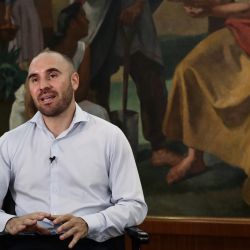Economy Minister Martín Guzmán, renegotiating a massive loan with the International Monetary Fund, has warned the lender it risks losing credibility if it "pushes" the country "into a destabilising situation."
Argentina has received US$44 billion of a US$57-billion loan the lender itself said last month had failed to achieve its objectives of restoring confidence in the country's fiscal viability and fostering economic growth.
Latin America's third-largest economy has been in recession since 2018 and is seeking to renegotiate its down payment plan, with amounts of US$19 billion and US$20 billion due in 2022 and 2023.
The country registered GDP growth of 10 percent in 2021 after a drop of 9.9 percent the previous year largely due to the coronavirus pandemic.
Guzmán, in an interview with AFP, said the repayment calendar was "unsustainable" for a country battling a poverty rate of some 40 percent and one of the highest inflation rates in the world at 50 percent.
The Peronist government of centre-left President Alberto Fernández, who refused to accept the last US$13 billion of the IMF's biggest-ever loan arranged in 2018 under his conservative predecessor Mauricio Macri, is seeking a deal that will reduce Argentina's fiscal deficit through economic growth, not reduced public spending.
What is Argentina's outlook for 2022, and is it possible that an agreement with the IMF will not be reached? There is talk of default: is there concern?
Argentina has a very high trade surplus, which is at the highest levels we have achieved. It was over US$15 billion in 2021.
What is the balance of payments problem facing Argentina in 2022? It is precisely the debt with the IMF. It is the reverse of what naturally happens. It is the debt with the IMF that generates the balance of payments problem. And that is why it is important to be able to refinance it. It is important for the country and also for the IMF.
If the IMF pushes Argentina into a destabilising situation, it will also have less legitimacy in the future when other countries require multilateralism in order to solve their problems together with the international community.
If we want to protect each other and protect the workings of multilateralism, it is important to agree on something that is credible. And credible means implementable.
We have a set of economic and social objectives, and of course we want to meet our commitments, but we need time. We need to be able to refinance these debts.
We need to ensure that for that time we are not charged with conditionality that will halt the recovery and inhibit Argentina's capacity for development in the medium and long term.
Do you expect a gesture from the United States, as the IMF's largest shareholder? What do you make of the call by Democratic lawmakers to US Treasury Secretary Janet Yellen to back a review of IMF surcharges on larger, outstanding loans, especially at a time that countries need additional resources to fight the pandemic?
It has been important to ask the US Treasury Secretary [Janet Yellen] to support a review of this policy in the IMF board, which harms countries in crisis that have what is called “exceptional access to the International Monetary Fund.” Because they are charged more when the situation is worse.
This ... does not help to fulfil the Fund's mission of ensuring global financial stability. Countries with these interest surcharges lose resources with which to carry out the investments needed to improve their repayment capacity.
What is the disagreement on the fiscal issue?
There is nearly agreement on where to converge; what is the primary fiscal outcome (before the payment of interest).
There is practically agreement on where we need to converge, what is the primary fiscal outcome [before interest payments on the debt]. The difference lies in the speed [of repayment] and this has to do with differing objectives.
In 2021, with an economy growing at 10 percent, the primary fiscal deficit fell by 3.5 points of GDP. The fiscal deficit in 2021 was between 2.9 and 3 percent of GDP; this figure will be known on 20 January. It is a strong decline. Good fiscal consolidation is taking place.
What the IMF has put forward is that there must be faster fiscal consolidation. But there are two problems: the first is that how they propose it be done would halt the economic recovery in the short term. The second is that the point on which the faster fiscal consolidation would focus would be on a smaller expansion of public infrastructure investment…
For us that is critical, because that investment is what Argentina needs most, from a productive point of view. That is where the tension lies.
A few days ago you referred to the difference between a perfect agreement or an acceptable, good, realistic agreement. Do you feel close to that?
There is no such thing as a perfect deal. When there is a situation where something is negotiated it is because there is an inconsistency, and what is defined is how the burdens are distributed.
What we are looking for is to take a step forward rather than a step back. I would say we are a little bit better than we were a week ago, but there is a long road ahead.
The frequency [of contacts with the IMF] is not only daily, but several times a day.
related news
by Philippe Bernes-Lasserre & Nina Negrón, AFP


























Comments